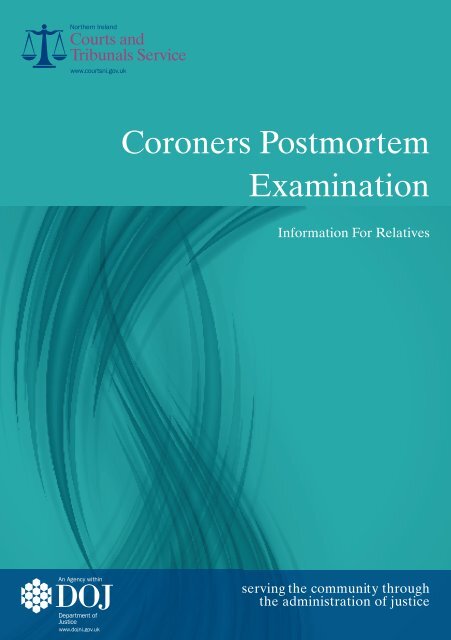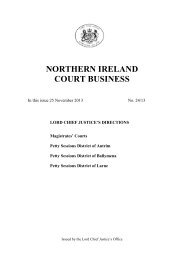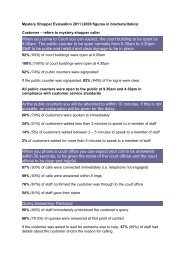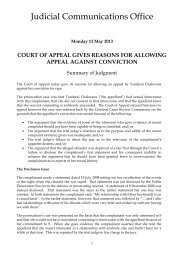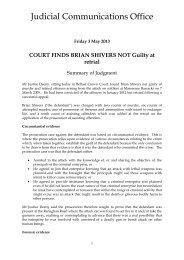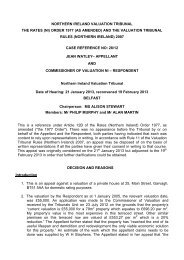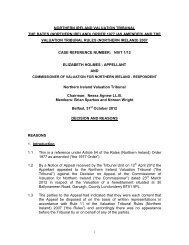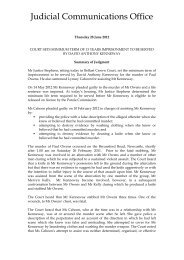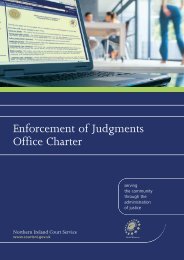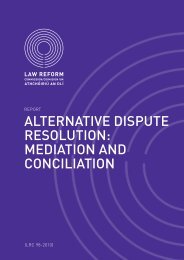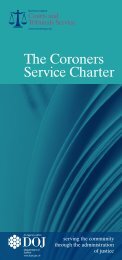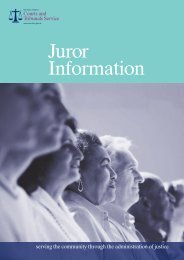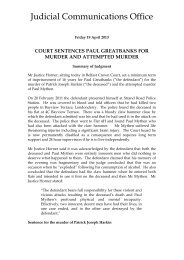Coroner's Postmortem Examination - Northern Ireland Court Service ...
Coroner's Postmortem Examination - Northern Ireland Court Service ...
Coroner's Postmortem Examination - Northern Ireland Court Service ...
You also want an ePaper? Increase the reach of your titles
YUMPU automatically turns print PDFs into web optimized ePapers that Google loves.
<strong>Northern</strong> <strong>Ireland</strong>www.courtsni.gov.ukCoroners <strong>Postmortem</strong>examinationinformation for relativesserving the community throughthe administration of justice
Coroners <strong>Postmortem</strong> examination - information for relatives3introductionThis leaflet gives information on a Coroner’s postmortemexamination. You will have been given a copy of this leafletbecause someone close to you has died and the Coroner,who has legal responsibility to investigate the death, hasdirected that a postmortem examination should be carriedout. The information in this leaflet will help you to understandwhat is involved in the postmortem process and what youroptions are in relation to the retention of tissue samples ororgans.You may have further questions about the Coroner’sinvestigation and there are a number of people who will beable to provide you with more information;• Coroners <strong>Service</strong> Staff (including the Coroners LiaisonOfficer)• Hospital Bereavement Staff• Funeral DirectorCoroners liaison officerCoroners Liaison Officers are members of staff of theCoroners <strong>Service</strong>. Their role is to help you with any questionsyou have about the Coroner’s investigation and thepostmortem examination. A Coroners Liaison Officer will bedesignated to you but if they are unavailable another officerwill still be able to help you.The Coroners Liaison Officer will contact you once thepostmortem examination has been completed and will giveyou their name, contact details and preliminary informationabout the examination. You can contact them directly on thenumber they give you or through the Coroners Office on 0289044 6800 or by e-mail at coronersoffice@courtsni.gov.uk.
4 serving the Community through the administration of justiCeWhy a Coroner directs a <strong>Postmortem</strong>examination to be Carried outThe law requires that in certain circumstances a death mustbe reported to a Coroner for investigation. The Coroner willusually be notified by a doctor or by the police, where a deathappears to be:• unexpected or unexplained;• as a result of violence;• an accident;• as a result of negligence;• due to industrial disease;• or from any cause other than natural illness or disease.Deaths must also be reported when:• the cause of death is unknown;• a doctor has not seen and treated the person for thefatal illness during the previous 28 days.When a death is reported to the Coroner the police will beauthorised to gather information to assist in the Coroner’sinvestigation. The postmortem examination is a key stagein this investigation. The findings from a postmortemexamination will help to establish the cause of death andwhether any further action on the part of the Coroner or policeis required.The Coroner will decide if a postmortem examination shouldbe carried out. The Coroner will direct the State Pathologist’sDepartment or Hospital Pathology Department to carry it out.Most Coroners’ postmortem examinations are carried outby the State Pathologist’s Department at <strong>Northern</strong> <strong>Ireland</strong>Regional Forensic Mortuary.
Coroners <strong>Postmortem</strong> examination - information for relatives5identifying the bodyYou or another family member may be asked to formallyidentify the body of the deceased. This could either be toa police officer at the place where the death has happenedor it could be later at the mortuary before the postmortemexamination is carried out.representation at a <strong>Postmortem</strong> examinationMembers of the public are not permitted to attend apostmortem examination as it is a medical procedure,however you may wish to be represented by a medicalpractitioner at the examination but this would be at your ownexpense.funeral arrangementsIf a death is reported to the Coroner you should not finalisefuneral arrangements until the Coroner has authorised therelease of the body for burial or cremation.Once satisfied that the postmortem procedure is completedthe Coroner will release the body to a funeral director ofyour choice and issue a burial or cremation order. Even if theCoroner is going to hold an inquest, the funeral can still takeplace as soon as the Coroner has released the body.The Coroners Liaison Officer or the police will be able toconfirm to you when the Coroner has released the body.
6 serving the Community through the administration of justiCeWhat is a <strong>Postmortem</strong> examination?A postmortem examination (also known as an autopsy) is anexamination of the body following death. It is carried out by apathologist, a doctor specialising in the study of disease andinjury in the body and in determining the cause of death. Thepathologist works to standards set by The Royal College ofPathologists.The postmortem examination will start with an initial externalexamination of the body followed by an internal examination.The pathologist will need to remove and examine the majorinternal organs. In most cases the organs are returned to thebody afterwards.Although some information can be obtained from lookingdirectly at organs in a postmortem examination, often the onlyway to understand properly what has happened is to lookat part of an organ under the microscope, carry out specialtests or obtain a second medical opinion. Occasionally it isnecessary to retain whole organs for further examination, asthis can provide more detailed understanding of the cause ofdeath.It is usually necessary to retain small tissue samples forfurther examination and for further tests such as lookingat chromosomes or genes or to search for infections dueto bacteria or viruses that may have caused a death. Thesamples of tissue taken for testing are usually retained in casethey are needed to answer further questions about the causeof death.
Coroners <strong>Postmortem</strong> examination - information for relatives7tissue samples, Blocks and slides • Small samples of tissue are removed from the organsand placed in small plastic containers. The samplesmeasure approximately 1.5 x 1.5 centimetres (smallerthan a postage stamp) and are up to 5 millimetres thick.• The tissue is chemically treated to remove water, whichis replaced with wax. This process creates tissue blocks.Very thin slices (sections) a tenth of the thickness of ahuman hair are then cut from the surface.• The sections are placed on glass slides so that they canbe examined under a microscope. More than one slidecan be cut from each block.• These techniques are the same as those used to examine tissue from living patients. The tissue blocks and slides are stored in special cabinets aspart of the medical pathology records.residual tissueThe process of creating tissue blocks and slides may createvery small amounts of unused or residual tissue. This isusually disposed of by incineration.
8 serving the Community through the administration of justiCex-rays, Photographs and other imagesIt may be necessary to x-ray or photograph the body or anorgan during the postmortem examination. These imagesform part of the record of investigation of the death. They areusually retained indefinitely. Their use is strictly controlled andconfidentiality is maintained at all times.viewing the body after the <strong>Postmortem</strong>examinationThe body will be prepared by the mortuary staff and thenreleased to your undertaker who can make arrangements foryou to view the body. Normally any incisions that have beenmade during the postmortem examination will not be visible.The funeral director will be able to tell you if there are anyvisible signs of the postmortem examination before you viewthe body.The body is normally released immediately after the Coroner’spostmortem examination. Exceptionally, usually in criminalcases, it may be necessary for the pathologist to retain thebody for re-examination a few days later. If this is the caseyou will be given information about this – every effort will bemade to release the body as quickly as possible.
Coroners <strong>Postmortem</strong> examination - information for relatives9the results of the <strong>Postmortem</strong> examinationThe pathologist will provide the preliminary results of thepostmortem examination to the Coroner very quickly. The finalwritten report may not be available for some considerabletime because further tests may need to be carried out andthese can take time to complete.The Coroners Liaison Officer will contact you as soon as thepreliminary results are available and will give these to you.They will also tell you about any organs or tissue that mayhave been retained following the postmortem examination.When the final postmortem report is completed it willbe sent to the Coroner who will forward a copy to thedeceased’s doctor. The next-of-kin will be informed whenthis happens and may also request a copy of the final reportfrom the Coroner. The report may contain complex medicalterminology, and you may wish to discuss the findings withyour family doctor.If you feel that you would like to discus the postmortemexamination with the pathologist who carried it out you shouldcontact the Coroners Liaison Officer who will arrange this.
10 serving the Community through the administration of justiCedeath CertificatesOn receipt of the final postmortem examination report, theCoroner will then consider if an inquest needs to be held.If the Coroner decides that an inquest is not necessary theRegistrar of Deaths will be notified and the death can then beregistered and a Death Certificate issued.If an inquest is to be held it will not be possible to register thedeath or have a Death Certificate issued until the inquest hasbeen completed.When registration of the death is delayed the Coroner canissue an interim certificate called “a Coroner’s Certificateof Evidence of Death” to assist in the administration of theestate. However not all financial institutions will accept thisand you may need to wait for the final registration of the deathbefore the administration of the estate can be completed.an inquestAn inquest is not a trial; it is a public inquiry by a Coroner,sitting with or without a jury, into the circumstancessurrounding the death. The purpose of the inquest is todetermine the identity of the person who has died, how,when and where they died, and to provide the details thatthe Registrar of Deaths requires to allow the death to beregistered.More information about the Coroner’s inquest is availablefrom the Coroners <strong>Service</strong>, Mays Chambers, 73 May Street,Belfast BT1 3JL. Telephone 028 9044 6800 or by e-mail atcoronersoffice@courtsni.gov.uk
Coroners <strong>Postmortem</strong> examination - information for relatives 11retained organs and tissueThe pathologist, with the authority of the Coroner, may needto retain any organs and tissue samples removed at thepostmortem examination to assist in the investigation intothe death. Once the Coroner’s investigation has finished, theCoroner will decide if these samples need to be retained or ifthey can be released.The Coroners Liaison Officer will contact you and discuss theCoroner’s decision and the options available to you.retained organs - further use or disposalIf the Coroner agrees to the release of retained organs youcan choose:• for the organs to be returned to you through your funeraldirector. It will be the family’s responsibility to arrange aseparate cremation or burial for these organs.• for the Coroner to authorise disposal of the organs in alawful and respectful way by the pathologist.• occasionally you may be asked if the organ can be usedfor teaching and research.
12 serving the Community through the administration of justiCetissue Blocks & slides - further use or disposalThe tissue blocks and slides will be stored by the Pathologiston behalf of the Coroner until the Coroner’s investigation iscompleted and the Coroner decides that they no longer needto be retained.The Royal College of Pathologists recommends that tissueblocks and slides form part of the medical pathology recordsand that they should be retained in case they need to bereviewed at a later time. If they are retained, access to themwill be strictly controlled and they will not be used for anypurpose without your permission.If however you request the release of the tissue blocks andslides, and the Coroner agrees, you can choose:• for the blocks, slides, and samples for genetic testingto be retained for future use ie. the wellbeing of futurepersons (including family members), education andtraining of health care professionals and, if suitable,research approved by an ethics committee;• for the tissue blocks and slides to be returned to youthrough your funeral director. It will be the family’sresponsibility to arrange a separate cremation or burialfor these. This means it may not be possible to have thecase fully reviewed or seek a second opinion at a laterdate. If family choice is collection of organs/tissues bya funeral director and this does not take place within 3months of contact the hospital will inform the CLO whowill clarify arrangements with the family.• for the Coroner to authorise disposal of the tissueblocks and slides in a lawful and respectful way by thepathologist.
Coroners <strong>Postmortem</strong> examination - information for relatives 13This leaflet is provided to give you information on a Coroner’spostmortem examination but if you have further questions onthis or on any of the work of the Coroner you should speakto the Coroners Liaison Officer or the staff in the CoronersOffice.useful Contact numbersFor further information on the work of the Coroners <strong>Service</strong>for <strong>Northern</strong> <strong>Ireland</strong> please contactCoroners <strong>Service</strong> for <strong>Northern</strong> <strong>Ireland</strong>Mays Chambers73 May StreetBelfast BT1 3JLTel: 028 9044 6800Fax: 028 9044 6801E-mail: coronersoffice@courtsni.gov.uk<strong>Northern</strong> <strong>Ireland</strong> Regional Forensic Mortuary: 028 9024 7271This leaflet is produced by the <strong>Northern</strong> <strong>Ireland</strong> <strong>Court</strong>s andTribunal <strong>Service</strong> in partnership with:• The Department of Health Social <strong>Service</strong>s and PublicSafety• The State Pathologist's Department
Coroners <strong>Postmortem</strong> examination - information for relatives 15Should you require any further information aboutthe NI <strong>Court</strong>s and Tribunals <strong>Service</strong> please visit ourwebsite at www.courtsni.gov.uk or alternativelycontact Communications Group.
16 serving the Community through the administration of justiCe<strong>Northern</strong> <strong>Ireland</strong> <strong>Court</strong>s and Tribunals <strong>Service</strong>Communications GroupLaganside House23-27 Oxford StreetBelfast BT1 3LAPhone: 028 9032 8594Fax: 028 9072 8942Textphone: 028 9041 2920Email: communicationsgroup@courtsni.gov.ukwww.courtsni.gov.ukJune 2011


